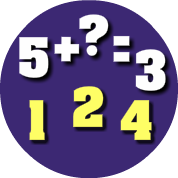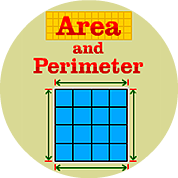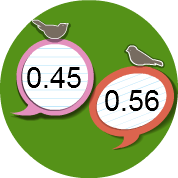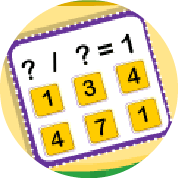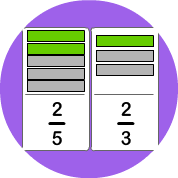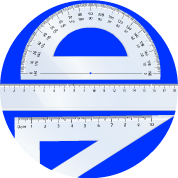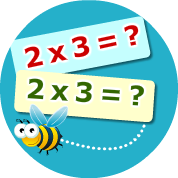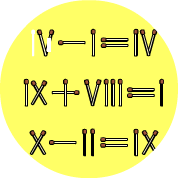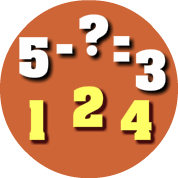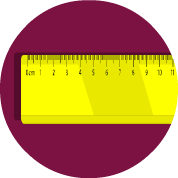- HOME
- GAMES
- THIRD GRADE
- MATH
Login as parent/teacher to assign this.
Math Games for 3rd Grade
Third Grade Math Games & Activities Kids Will Enjoy
By the time kids hit third grade, they feel like they know a thing or two. Practicing with flash cards and doing repetitive worksheets is something that they will avoid doing like the plague, eager to argue with you about the merit of each activity. Go one step ahead and present them with the Turtle Diary option, where they can play cool games without realizing they’re doing hard work practicing their math skills.
It will give them an upper edge in the classroom and instill in them the confidence they will need to move forward in their math learning in the classroom. There’s nothing worse than not understanding the next concept because you didn't put in the time to learn your basic facts. Help your kids overcome this by using Turtle Diary at home.
It will give them an upper edge in the classroom and instill in them the confidence they will need to move forward in their math learning in the classroom. There’s nothing worse than not understanding the next concept because you didn't put in the time to learn your basic facts. Help your kids overcome this by using Turtle Diary at home.
What Games Are Best for Third Grade?
High-Interest Fun
Top priority for parents is satisfying their kids' educational needs. Kids\’ top priority is having fun. Turtle Diary provides the best of both worlds with incredibly entertaining games that use mathematics as the method by which kids navigate the games.
Crossing the road while using rapid fire math facts or playing board games by answering problems gives kids incentive and instant gratification for knowing their math. It’s more interesting than the flashcards of our youth.
Crossing the road while using rapid fire math facts or playing board games by answering problems gives kids incentive and instant gratification for knowing their math. It’s more interesting than the flashcards of our youth.
Amazing Graphics and Sounds
Games are fun as long as they move beyond basic pixels. School competes with amazing video game consoles and online gaming, so it’s got to be enough to intrigue them. Turtle Diary has a variety of options, including multiplayer games that enable kids to play with their friends across the internet. The sounds not only drive them forward but correspond with their actions.
Repetitive Practice
It may be hard for parents to allow online games instead of the traditional flashcards and worksheets, but Turtle Diary has something that they don’t. The repetitive practice within our games enables kids to have continuous fun with different game styles while still practicing the same skills in each. Kids won’t even realize the repetitive nature of the practice as they would with another session of flashcards-at-the-table.
What Do You Learn from 3rd Grade Math Games?
Multiplication & Division
Multiplication and division are inextricably linked, so it’s imperative to learn them both. Once addition and subtraction are mastered, students must move onto these more advanced skills.
Multiplication facts are typically learned in succession as are addition facts. It does require some repetitive practice, but Turtle Diary makes that fun with a variety of gaming options. Understanding factors and their relationship will help kids grasp division as well, as the product becomes the dividend. Playing a multiplication game will help them solidify these skills as they correctly answer the practice problems.
Multiplication facts are typically learned in succession as are addition facts. It does require some repetitive practice, but Turtle Diary makes that fun with a variety of gaming options. Understanding factors and their relationship will help kids grasp division as well, as the product becomes the dividend. Playing a multiplication game will help them solidify these skills as they correctly answer the practice problems.
Basic Geometry
Kids will take their shape knowledge to the next level this year working with perimeter and angles. Once multiplication is mastered, they can easily calculate the area and perimeter of quadrilaterals as well. Manipulating shapes and identifying them based on angles and sides will be a skill that helps them when more advanced geometry arrives. They will also specifically focus on identifying triangles based on angles as well.
Probability
Teaching kids the basics of probability and the difference between mean, median, mode, and range seems to be a tedious task, but Turtle Diary adds all the fun for third graders. With games created for each piece of this puzzle, kids will never get bored solving problems with different uses for both skills.
Roman Numerals
While it may seem archaic, Roman Numerals are still used around the world in a variety of ways. Kids need the basics of Roman Numerals to 100 to be functional and to recognize their utility over time. Students learn the utility of these ancient numbers and where they still occur. The Super Bowl still uses them!
Telling Time
By third grade, kids should be able to tell both digital and analog time, though some might still have a hard time grasping the concept of one minute vs. 60 seconds. Giving them ample time to practice and sit to “feel” the time pass is key. Games with clocks are fun, and you can always practice time management at home. Be sure that they are using both an analog clock and a digital clock in the game.
Unit Conversion
Metric to standard, measure to volume, students need to have a firm grasp on basic measurements before they find themselves in a lab. They will also need to know how to round a number to the nearest digit, whether ones, tens, or hundreds. Turtle Diary offers a variety of games to prepare them, including rounding multiple digit numbers and unit conversion to give them extra practice in this area. Look for real-life examples of measurements rather than black-and-white problems.
Basic Measurement
Get their rulers ready and move on to the measurements. Whether unit-based or content-based, measurement is still a vital skill for Third Graders. Games with real-life scenarios will help them to see the importance of these skills.
Keep your third grader immersed in math by allowing Turtle Diary’s fun-filled games to be an everyday option for math review and practice. It will not only supplement what they’re learning in the classroom but will also keep math fun for them. Often around this time math becomes a chore because of the repetitive practice required. Turtle Diary keeps them engaged and having fun as they practice these essential skills.
Our Educational Resources
Math Games
- Addition
- Area and Perimeter
- Decimals
- Division
- Fractions
- Shapes
- Geometry
- Multiplication
- Number
- Roman Numerals
- Statistics
- Subtraction
- Time
- Units of Measurement


